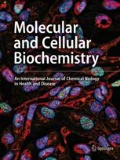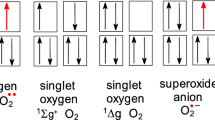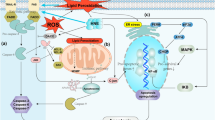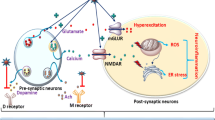Abstract
Cigarette smoke is a complex mixture of more than 4700 chemical compounds including free radicals and oxidants. Toxicity exhibited by cigarette smoke may be due to combined action of these compounds inducing many cellular processes mediated through reactive oxygen species (ROS). Major player probably nicotine as it is present in tobacco, in higher concentrations. The compounds that induce intracellular oxidative stress recognized as the important agents involved in the damage of biological molecules. Experiments using animal and cell culture model systems suggested that moderately higher concentrations of some forms of ROS like NO and H2O2 can act as signal transducing agents. Nuclear transcription factor κB (NF-κB) an inducible transcription factor detected in neurons found to be involved in many biological processes such as inflammation, innate immunity, development, apoptosis, and antiapoptosis. Our present study demonstrates that nicotine induces ROS levels in a dose dependent manner in rat mesencephalic cells. Electro mobility shift analysis showed that nicotine activates inducible NF-κB by binding to consensus sequence of DNA. Nicotine added to cell culture stimulates the degradation of IκB-α subunit in 2 h. Further activation of c-Jun terminal kinase indicates that nicotine induces oxidative stress leading to activation of stress dependent NF-κB pathway in mesencephalic cells.
Similar content being viewed by others
References
Pailer M (1964) Chemistry of nicotine and related alkaloids (including biosynthetic aspects). In: Von Euler US (eds) Tobacco Alkaloids and Related Compounds. The McMillan Co: New york pp. 15–36
Hammond D, Collishaw NE, Callard C (2006) Secret science: tobacco industry research on smoking behaviour and cigarette toxicity. Lancet 367: 781–787
Maneckjee R, Minna JD (1994) Opioids induce while nicotine suppresses apoptosis in human lung cancer cells. Cell growth Diff 5: 1033–1040
Mandelzys A, Cooper E (1992) Effects of ganglionic satellite cells and NGF on the expression of nicotine acetylcholine currents by rat sensory neurons. J Neurophysiol 67: 1213–1221
Heeschen C, Jang JJ, Weis M, Pathak A, Kaji S, Hu RS, Tsao PS, Johnson FL, Cooke JP (2001) Nicotine stimulates angiogenesis and promotes tumor growth and atherosclerosis. Nat Med 7: 833–839
Heusch WL, Maneckjee R (1998) Signalling pathways involved in nicotine regulation of apoptosis of human lung cancer cells. Carcinogen 19: 551–556
Macklin KD, Maus AD, Pereira EF, Albuquerque EX, Conti-Fine BM (1998) Human vascular endothelial cells express functional nicotinic acetylcholine receptors. J Pharmacol Exp Ther 287: 435–439
Wright SC, Zhong J, Zhong H, Larrick JW (1993) Nicotine inhibition of apoptosis suggests a role in tumor promotion. FASEB J 7: 1045–1051
Minna JD (2003) Nicotine exposure and bronchial epithelial cell nicotinic acetylcholine receptor expression in the pathogenesis of lung cancer. J Clin Investig 111: 31–33
Cattaneo MG, D’Atri F, Vicentini IM (1997) Mechanisms of mitogen-activated protein kinase activation by nicotine in small-cell lung carcinoma cells. Biochem J 328: 499–503
Dasgupta P, Rastogi S, Pillai S, Ordonez-Ercan D, Morris M, Haura E, Chellappan S (2006) Nicotine induces cell proliferation by {beta}-arrestin-mediated activation of Src and Rb-Raf-1 pathways. J Clin Invest 3: 7–20
Wang HY, Lee DH, Davis CB, Shank RP (2000) Amyloid peptide Abeta(1–42) binds selectively and with picomolar affinity to alpha7 nicotinic acetylcholinereceptors. J Neurochem 75: 1155–1161
Baeuerle PA, Kenkel T (1994) Function and activation of NF-kappa B in the immune system. Ann Rev immunol: 12: 141–179
Huie RE, Padmaja S (1993) The reaction of NO with superoxide. Free Radical Res Commun 18:195–199
Pahl HL (1999) Activators and target genes of Rel/NF-κB transcription factors. Oncogene 18: 6853–6866
Lin A, Karin M (2004) NF-κB in cancer a marked target. Semin Cancer Biol 13: 107–114
Chen LF, Greene WC (2004) Shaping the nuclear action of NF-κB. Nature Rev Mol Cell Biol 5: 392–491
Kaltschmidt C, Kaltschmidt B, Neumann H, Wekerle H, Baeuerle PA (1994) Constitutive NF-κB activity in neurons. Mol Cell Biol 14: 3981–3992
Widera D, Mikenberg I, Kaltschmidt B, Kaltschmidt C (2006) Potential role of NF-κB in adult neural stem cells; the understand steersman. Int J Devl Neurosci 24: 91–102
Schneider A, Martin-Villalba A, Weih F, Vogel J, Wirth T, Schwaninger M (1999) NF-kappaB is activated and promotes cell death in focal cerebral ischemia. Nat Med 5: 554–559
Doolittle DJ, Winegar R, Lee CK, Caldwell WS, Hayes AW, de Bethizy JD (1995) The genotoxic potential of nicotine and its major metabolites. Mutat Res 344: 95–102
Mizusaki S, Okamoto H, Akiyama A, Fukuhara Y (1977) Relation between chemical constituents of tobacco and mutagenic activity of cigarette smoke condensate. Mut Res 48: 319–325
Manna SK, Rangaswamy T, Wise K, Sarkar S, Shishodia S, Biswal S, Ramesh GT (2006) Long term environmental tobacco smoke activates nuclear transcription factor-kappa B, activator protein-1 and stress responsive kinases in mouse brain. Biochem Pharmacol 71:1602–1609
Husain K, Scotttt BR, Reddy SK, Somani SM (2001) Chronic ethanol and nicotine interaction on rat tissue antioxidant defense system. Alcohol 2: 89–97
Agarwal BB (2004) Nuclear factor kappa the enemy with in. Cancer cell 6:203–208
Campain JA (2004) Nicotine potentially a multifunctional carcinogen. Toxicol Sci 79: 1–3
Karin M (1995) The regulation of AP-1 activity by mitogen-activated protein kinases. J. Biol Chem 270: 16483–16486
Gensch E, Gallup M, Sucher A, Li D, Gebremichael A, Lemjabbar H, Mengistab A, Dasari V, Hotchkiss J, Harkema J, Basbaum C (2004) Tobacco smoke control of mucin production in lung cells requires oxygen radicals AP-1 and JNK. J Biol Chem 279: 39085–39093
Marwick JA, Kirkham PA, Stevenson CS, Danahay H, Giddings J, Butler K, Donaldson K, Macnee W, Rahman I (2004) Cigarette smoke alters chromatin remodeling and induces proinflammatory genes in rat lungs. Am J Respir Cell Mol Biol 31: 633–642
Manna SK, Ramesh GT (2005) Interleukin-8 induces nuclear transcription factor-κB through TRAF6- dependent pathway. J Biol Chem 280: 7010–7021
Acknowledgment
This work was supported by NSF HRD0401587: NASA NCC 9–165: NIH/RCMI RR03045–19 (GR).
Author information
Authors and Affiliations
Corresponding author
Rights and permissions
About this article
Cite this article
Barr, J., Sharma, C.S., Sarkar, S. et al. Nicotine induces oxidative stress and activates nuclear transcription factor kappa B in rat mesencephalic cells. Mol Cell Biochem 297, 93–99 (2007). https://doi.org/10.1007/s11010-006-9333-1
Received:
Accepted:
Published:
Issue Date:
DOI: https://doi.org/10.1007/s11010-006-9333-1




